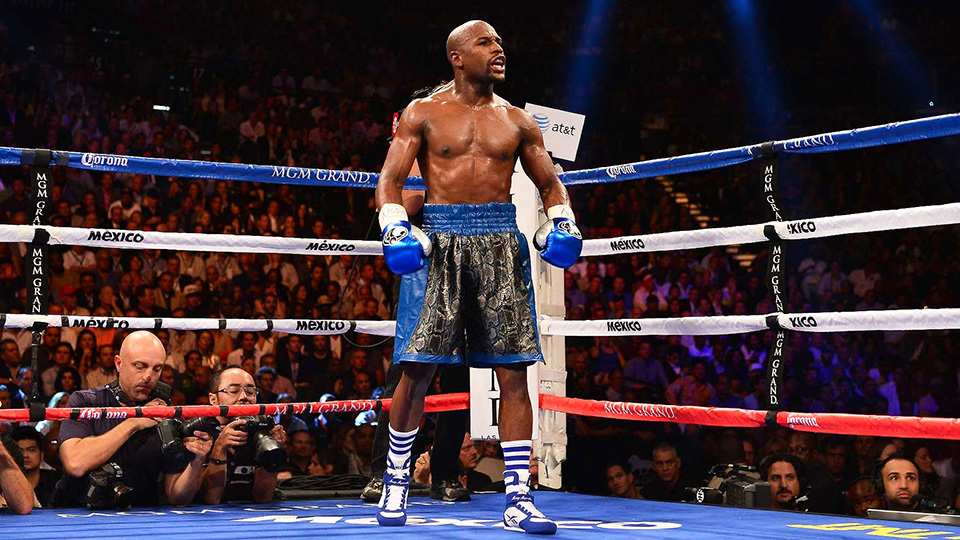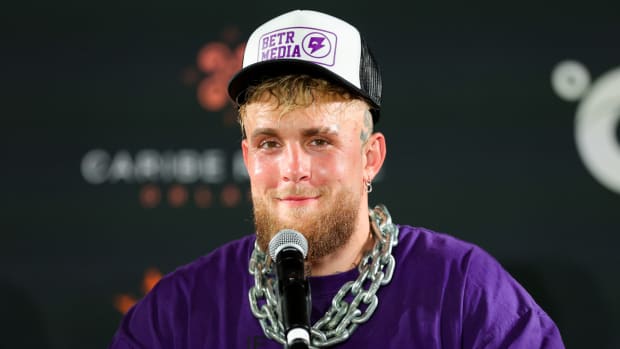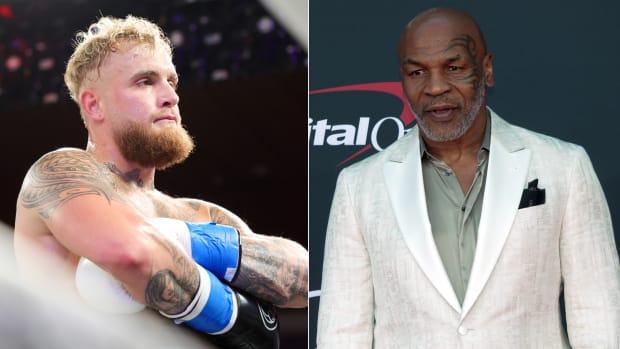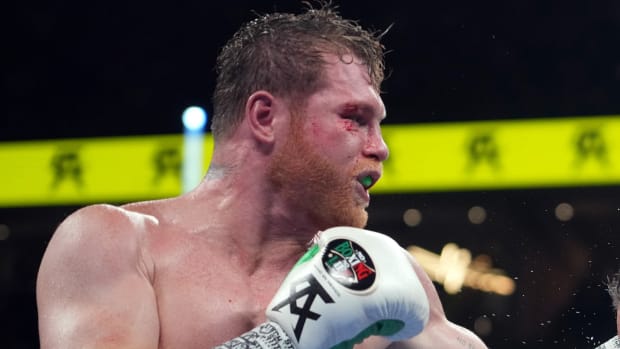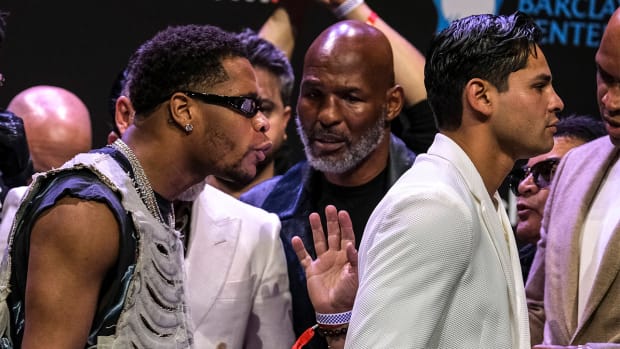Roundtable: After final fight, what will Floyd Mayweather's legacy be?
On Saturday, Floyd Mayweather says he will step in the ring for the final time when he takes on Andre Berto at the MGM Grand in Las Vegas. How will we remember Floyd Mayweather? SI.com's Chris Mannix, Greg Bishop and Rich O'Brien weigh in.
Chris Mannix
I’d like nothing more than to remember Floyd Mayweather as the greatest fighter of this generation, as one of the best defensive fighters in boxing history, as the single best businessman in sports who, with a big assist from advisor Al Haymon, created the most lucrative empire of any athlete—and who did it without so much as a nickel the last few years in endorsements. Mayweather is all those things; unfortunately, when we remember him, those won’t be the first things we think of.
Mayweather's retirement from boxing will be a welcome change for the sport
I will think of all the negativity, of all the countless articles I was forced to write and read about his maddening decisions in the ring and his abhorrent ones out of it. Mayweather could have been a legend, could have been, as he loves to say he is already, the best ever. If he fought the fights that were out there—if he had engaged Manny Pacquiao in a trilogy, if he had taken on Miguel Cotto earlier in his career, if he had picked apart Paul Williams, if he had challenged Tim Bradley—his resume would have be bulletproof. Instead, we spend too much time, waste too many column inches on the fights Mayweather didn’t fight, of his baseless defenses of opponents everyone knew were not worthy.
It would have been so easy for Mayweather to change the narrative. He would have been favored against all of the aforementioned opponents. He’s still very much at the top of his game now, but five years ago he was nearly impossible to hit cleanly and even faster and more elusive than he is now. And that’s the maddening part of it. He tactically avoided fighters he would have beat, for no other reasons than who promoted them (Bob Arum, most notably) or that they refused to comply to his every demand.
I would like to remember Mayweather for what he was—the type of supremely talented athlete we may not see again for generations. Instead, I will remember him for the things he decided to be.
Greg Bishop
How will I remember Floyd Mayweather? I’ll remember one of the first times I interviewed him, at the Mayweather Boxing Club in Las Vegas. I was there to write about the financial structure of his fights, how much money he pockets, how he collects profit on the back end. He beckoned me toward the ring apron and told me to “put on your big boy pants” and proceeded to do about half of the 45-minute interview with one sweaty, gloved arm draped around my neck. In that discussion, he compared his strip-club spending habits to a stimulus package and gave one of my all-time favorite quotes. “You see that arena Saturday?” he said. “It’s all Mayweather money. Want a hot dog? Mayweather money. Want a T-shirt? Mayweather money. I need all that.” That was Mayweather: charming and loquacious and just, well, odd.
I’ll remember the Victor Ortiz fight, the head-butt from Ortiz, the way he planted a kiss on Mayweather’s cheek. It was bizarre, even for boxing. And yet, it was Mayweather who was scorned afterward, for two legal punches Ortiz never saw coming that resulted in a knockout and for the way Mayweather screamed at HBO analyst Larry Merchant in the ring afterward. Mayweather wore orange-tinted sunglasses to his news conference that night. That was Mayweather: sunglasses indoors.
I’ll remember the Pacquiao fight and the 17 days I went to Mayweather’s gym in the month that led up to it. I’ll remember Zab Judah chasing Demarcus “Chop Chop” Corley down the street with what looked like a knife. I’ll remember how disinterested Mayweather seemed, how the same routine appeared more like a chore for him, how the spunk was gone. He didn’t even flash wads of hundreds anymore. He only collected them.
I’ll remember the consistency, the defensive brilliance, the celebrities at ringside, the bodyguards, the hangers-on, the cars, the arrests, the accusations from so many different women. I’ll remember the flawless boxer (and by flawless, I mean, in terms of his record and his performances, not always his choice of opposition). And I’ll remember the flawed human who rationalized his history of domestic violence and surrounded himself with a cadre of enablers. This isn’t a popular opinion, but I’ll remember Mayweather as complicated more than anything. There were times that he was likeable and times that he was impossible to like. I enjoyed a lot of the time I spent with him.
How will I remember Floyd Mayweather? I’ll remember him once more when he’s fighting again next year. It’s all Mayweather money, after all.
Richard O’Brien
Showtime executive Espinoza talks Floyd Mayweather's final fight, more
How will I remember Floyd Mayweather? I’ll remember the many electrifying moments he brought us during his 19-year career: I’ll remember him in the second Pacquiao fight—September 2009, the real Thrilla in Manila—reinventing himself mid-bout as a brawler to beat Pacquiao to the punch again and again, pounding out a brutal split-decision victory to avenge his TKO loss in their first fight and set up the pair’s epic rubber match. I’ll remember him in the Paul Williams fight in ’07, Mayweather repeatedly braving the much bigger Williams’s firepower to pick the challenger apart on the way to a dramatic late stoppage. I’ll remember the decisive victories over Joel Casamayor, Antonio Margarito and, in his triumphant farewell, Amir Khan. Or maybe I’ll simply remember Floyd best for his extensive charity work and support for women’s rights.
Oh, wait—none of those things happened.
I guess that’s what I’ll think of when I look back at Mayweather’s career: the moments this gifted, disciplined, well-schooled, ring-smart fighter could have given us. That we never saw him really tested, really at the limit, is due largely, of course, to his business-first approach (and, like it or not, who can really fault him for that?), but also to his skill-set. Was Mayweather—the preeminent boxer of his era—a genuine all-timer? Absolutely. At least in the sense that, were he magically transported to any other era in boxing history, he would have held his own. He’d have had to fight differently and more often, take more chances and more punishment, but he’d have been a contender and probably a champ.
Indeed, for all his money, 24/7 glitz and social media savvy, Mayweather has always been something of a throwback—the product of a boxing family who grew up in the gym and lived and breathed the sport for decades. That’s an increasingly rare package these days, and with Mayweather’s departure I’ll miss the genuine thrill of seeing such a fighter in action—even if I was so often left wishing for more.
